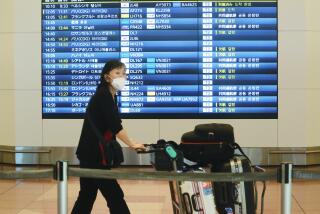Japan reports dozens of new swine flu cases
- Share via
TOKYO — Japanese health officials confirmed dozens of new cases of swine flu in a series of announcements Sunday, as the government shut down schools and canceled community activities in affected cities.
Japan now has at least 92 cases, most of them teenagers.
The country had just four confirmed H1N1 cases as of Friday, all of whom were believed to have caught the flu outside the country.
Health and Welfare Ministry official Haruki Ogawa said the number of cases could rise quickly with results on more viral sample tests pending.
Hospitals have set up “fever clinics” to separate possible swine flu carriers from other outpatients. Local governments have hot lines to guide people with flu symptoms. Newspapers also published graphics explaining the proper ways to wash hands and gargle.
The news of the rapid spread of the virus at schools came a day after Japan confirmed its first domestically contracted case of swine flu, a student in the western port city of Kobe, about 270 miles west of Tokyo. Japan’s first reported cases were three high school students and a teacher who had returned from a trip to Canada. The government immediately ordered schools closed in the affected areas.
“We have not determined how the virus spread in the region, and we are doing our best to track down the route of the infections and contain them,” Chief Cabinet Secretary Takeo Kawamura said.
The first four cases were detected at an airport quarantine early this month. Officials said they did not know whether those four cases were related to the latest outbreak.
“Many people were infected in such a short period of time,” Osaka Gov. Toru Hashimoto said at a news conference. “We must be prepared for a further expansion.”
The H1N1 swine flu virus is a new influenza strain. Health officials have warned that it could eventually infect millions of people.
The World Health Organization has confirmed at least 8,480 cases of swine flu in nearly 40 countries, mostly in the U.S. and Mexico, including 72 deaths.
More to Read
Sign up for Essential California
The most important California stories and recommendations in your inbox every morning.
You may occasionally receive promotional content from the Los Angeles Times.













